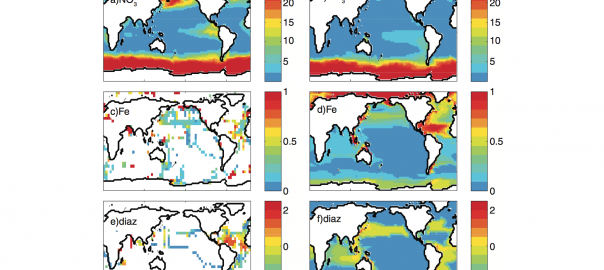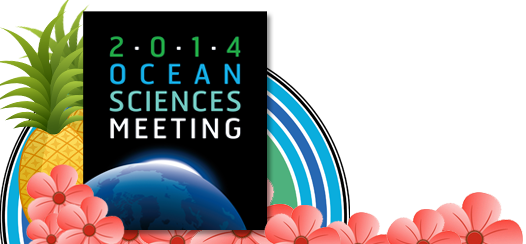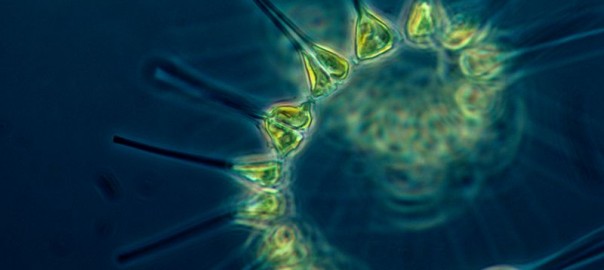Dutkiewicz, S., J.J. Morris, M.J. Follows, J. Scott, O. Levitan, S.T. Dyhrman, and I. Berman-Frank, 2015, Impact of Ocean Acidification on the Structure of Future Phytoplankton Communities. Nature Climate Change, doi: 10.1038/nclimate2722
Dutkiewicz, S., J.J. Morris, M.J. Follows, J. Scott, O. Levitan, S.T. Dyhrman, and I. Berman-Frank, 2015, Impact of Ocean Acidification on the Structure of Future Phytoplankton Communities. Nature Climate Change, doi: 10.1038/nclimate2722

In their new competition theory paper, appearing in the 2014 issue of Biogeosciences, Dutkiewicz et al examine the sensitivity of the biogeography of nitrogen fixers to a warming climate and increased aeolian iron deposition in the context of a global earth system model. Continue reading Life on the Edge – How shifting marine province boundaries could provide a new metric for global change
Death, R., J.L. Wadham, F. Monteiro, A.M. Le Brocq, M. Tranter, A. Ridgwell, A., S. Dutkiewicz, and R. Raiswell, (2014) Antarctic Ice Sheet fertilises the Southern Ocean, Biogeosciences, 11, 2635-2643, doi: 10.5194/bg-11-2635-2014

Leaving the cold of a New England February behind, the Darwin team will be in full attendance at this year’s Ocean Sciences conference taking place February 23-28 in Honolulu, Hawaii.
Winners and Losers: Phytoplankton in a Changing Climate
Stephanie Dutkiewicz at MIT Future Ocean Symposium, September 9, 2013.

by Alli Gold Roberts (MIT Joint Program on the Science and Policy of Global Change)
Read this story at MIT News
Phytoplankton — small plant-like organisms that serve as the base of the marine ecosystem — play a crucial role in maintaining the health of our oceans by consuming carbon dioxide and fueling the food web. But with a changing climate, which of these vital organisms will survive, and what impact will their demise have on fish higher up the chain?
Stephanie Dutkiewicz, a researcher with the MIT Joint Program on the Science and Policy of Global Change, and her colleagues developed a model that investigates the potential effects of climate change on phytoplankton.
Ice-core measurements reveal a highly asymmetric cycle in Antarctic temperature and atmospheric CO2 over the last 800,000 years. Both CO2 and temperature decrease over 100,000 years going into a glacial period, then rise steeply over less than 10,000 years at the end of a glacial. There does not yet exist wide agreement about the causes of this cycle or about the origin of its shape. In this article, recently accepted in the journal Global Biogeochemical Cycles, Darwin researchers Anne Willem Omta, Mick Follows and co-authors, explore the possibility that an ecologically driven oscillator may play a role in the dynamics.
Continue reading On the potential role of marine calcifiers in glacial-interglacial dynamics
Dutkiewicz, S., J.R. Scott and M.J. Follows (2013), Winners and losers: Ecological and biogeochemical changes in a warming ocean, Global Biogeochemical Cycles, vol. 27, pp. 463, doi: 10.1002/gbc.20042